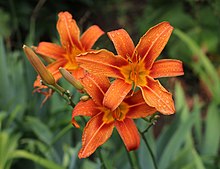Clinfowiki
Contents
| Fulvous | |
|---|---|
| Hex triplet | #E48400 |
| sRGBB (r, g, b) | (228, 132, 0) |
| HSV (h, s, v) | (35°, 100%, 89%) |
| CIELChuv (L, C, h) | (64, 101, 38°) |
| Source | [1] |
| ISCC–NBS descriptor | Strong orange |
| B: Normalized to [0–255] (byte) | |
Fulvous /ˈfʊlvəs/ is a colour, sometimes described as dull orange, brownish-yellow or tawny; it can also be likened to a variation of buff, beige or butterscotch. As an adjective it is used in the names of many species of birds, and occasionally other animals, to describe their appearance. It is also used as in mycology to describe fungi with greater colour specificity, specifically the pigmentation of the surface cuticle, the broken flesh and the spores en masse.
The first recorded use of fulvous as a colour name in English was in the year 1664.[1] Fulvous in English is derived from the Latin "fulvus", a term that can be recognised in the scientific binomials of several species, and can provide a clue to their colouration.
Birds


- Fulvous babbler
- Fulvous owl
- Fulvous parrotbill
- Fulvous shrike-tanager
- Fulvous whistling duck
- Fulvous wren
- Fulvous-bellied antpitta
- Fulvous-breasted flatbill
- Fulvous-breasted woodpecker
- Fulvous-chested jungle-flycatcher
- Fulvous-chinned nunlet
- Fulvous-crested tanager
- Fulvous-dotted treerunner
- Fulvous-headed brush-finch
- Fulvous-headed tanager
- Fulvous-vented euphonia
- Gyps fulvus, the griffon vulture
- Pluvialis fulva, the Pacific golden plover
- Mulleripicus fulvus, the ashy woodpecker
- Petrochelidon fulva, the cave swallow
Reptiles
Mammals
- Fulvous harvest mouse
- Fulvous pygmy rice rat
- Fulvous-bellied climbing rat
- Fulvus roundleaf bat
- Eulemur fulvus, the common brown lemur
- Spermophilus fulvus, the yellow ground squirrel
Fish
- Cephalopholis fulva, the coney
- Starksia fulva, the yellow blenny
Invertebrates

- Fulvous dawnfly
- Fulvous forest skimmer
- Dorylus fulvus, a West African ant
- Technomyrmex fulvus, a Central American ant
- Nylanderia fulva, a South American ant
- Paratrechina fulva, a South American ant
- Aphaenogaster fulva, a nearctic American ant
- Smicronyx fulvus, a sunflower seed weevil
- Tigriopus fulvus, a marine copepod
- Menemerus fulvus, a Japanese jumping spider
- Megahexura fulva, the tawny dwarf tarantula
- Euconulus fulvus, a New Zealand land snail
- Rhagonycha fulva, the common red soldier beetle
- Libellula fulva, the scarce chaser; a British dragon fly
- Aplysina fulva, a scattered pore rope sponge
Fungi
- Fomes fulvus, a North American conk
- Amanita fulva
- Mycovellosiella fulva, a plant pathogen
- Byssochlamys fulva, a plant pathogen
- Cladosporium fulvum, a plant pathogen
- Xanthoria fulva, a lichen
Prokaryotes
Plants

The tawny daylily's scientific name is hemerocallis fulva - Chrysopogon fulvus, red false beardgrass
- Hemerocallis fulva, tawny daylily
- Iris fulva, copper iris
- Polyscias fulva a West African parasol tree
- Ulmus fulva, slippery elm
- Quercus fulva, an endemic Mexican oak
- Utricularia fulva, an Australian carnivorous plant
- Livistona fulva, a palm having fronds with golden undersides
- Madhuca fulva, a threatened tree endemic to Sri Lanka
- Arachnorchis fulva, the tawny spider-orchid
- Arctophila fulva, arctic march grass

















